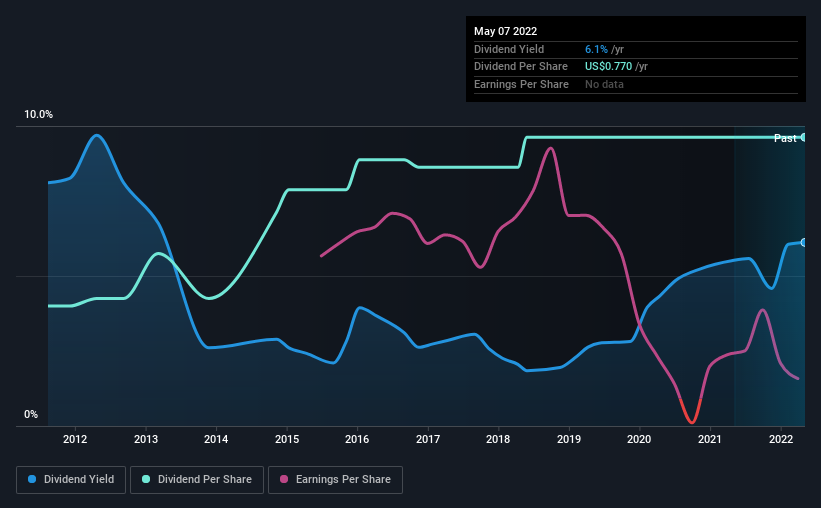Universal Insurance Holdings (NYSE:UVE) Will Pay A Dividend Of US$0.16
The board of Universal Insurance Holdings, Inc. (NYSE:UVE) has announced that it will pay a dividend on the 20th of May, with investors receiving US$0.16 per share. The dividend yield will be 6.1% based on this payment which is still above the industry average.
View our latest analysis for Universal Insurance Holdings
Universal Insurance Holdings' Payment Has Solid Earnings Coverage
While it is great to have a strong dividend yield, we should also consider whether the payment is sustainable. Prior to this announcement, the company was paying out 173% of what it was earning, however the dividend was quite comfortably covered by free cash flows at a cash payout ratio of only 17%. Healthy cash flows are always a positive sign, especially when they quite easily cover the dividend.
Looking forward, earnings per share is forecast to rise exponentially over the next year. Assuming the dividend continues along recent trends, we estimate that the payout ratio could reach 50%, which is in a comfortable range for us.
Dividend Volatility
While the company has been paying a dividend for a long time, it has cut the dividend at least once in the last 10 years. Since 2012, the dividend has gone from US$0.32 to US$0.77. This works out to be a compound annual growth rate (CAGR) of approximately 9.2% a year over that time. We like to see dividends have grown at a reasonable rate, but with at least one substantial cut in the payments, we're not certain this dividend stock would be ideal for someone intending to live on the income.
The Dividend Has Limited Growth Potential
Given that the dividend has been cut in the past, we need to check if earnings are growing and if that might lead to stronger dividends in the future. Over the past five years, it looks as though Universal Insurance Holdings' EPS has declined at around 34% a year. Dividend payments are likely to come under some pressure unless EPS can pull out of the nosedive it is in. Over the next year, however, earnings are actually predicted to rise, but we would still be cautious until a track record of earnings growth can be built.
Universal Insurance Holdings' Dividend Doesn't Look Sustainable
Overall, we don't think this company makes a great dividend stock, even though the dividend wasn't cut this year. In the past, the payments have been unstable, but over the short term the dividend could be reliable, with the company generating enough cash to cover it. We don't think Universal Insurance Holdings is a great stock to add to your portfolio if income is your focus.
It's important to note that companies having a consistent dividend policy will generate greater investor confidence than those having an erratic one. Meanwhile, despite the importance of dividend payments, they are not the only factors our readers should know when assessing a company. As an example, we've identified 3 warning signs for Universal Insurance Holdings that you should be aware of before investing. Looking for more high-yielding dividend ideas? Try our collection of strong dividend payers.
Have feedback on this article? Concerned about the content? Get in touch with us directly. Alternatively, email editorial-team (at) simplywallst.com.
This article by Simply Wall St is general in nature. We provide commentary based on historical data and analyst forecasts only using an unbiased methodology and our articles are not intended to be financial advice. It does not constitute a recommendation to buy or sell any stock, and does not take account of your objectives, or your financial situation. We aim to bring you long-term focused analysis driven by fundamental data. Note that our analysis may not factor in the latest price-sensitive company announcements or qualitative material. Simply Wall St has no position in any stocks mentioned.

 Yahoo Finance
Yahoo Finance 